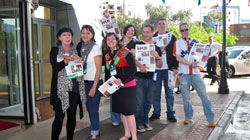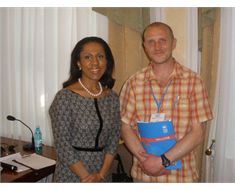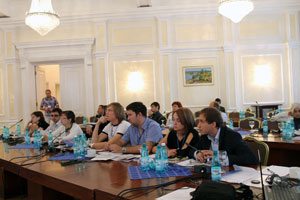Activists of the Association of Substitution Therapy Advocates of Ukraine use the web-site of the Association to share the stories about the international conferences they attended and to tell their counterparts about the new experience and new knowledge they acquired on various international meetings.
An activist Olga Beliayeva shares her experience of the 22nd Harm Reduction Conference she attended in Beirut, Lebanon. Her trip was supported by International Network of People who Use Drugs (INPUD). In the article Olga wrote she described he impressions of the city and local culture, talked about a medication to be used in case of overdose of drugs which was presented during the conference and posted her thoughts on how the harm reduction programs in Ukraine could be improved through personal development of the patricians of the programs. She wrote:
На второй день работы я услышала, что принято наркоманию рассматривать с точки зрения общественного здоровья и прав человека.
На сессиях обсуждались услуги для потребителей наркотиков. Люди возмущались, слушая случаи нарушения прав. Я искала слова о том, что важно создавать сервисы, где качественным результатом будет изменение личности, совершенствование.
Да, многие говорят, что у наркоманов уникально развиты способности. Их бы только в мирное русло.Однако, в наших программах снижения вреда, на мой взгляд, нет индивидуального подхода. Есть благодатная почва: программы ЗПТ. Люди стабильны, доступны …
И что? Консультации, если есть, только по вопросам ВИЧ, туберкулеза, гепатитов.
Согласитесь, когда человек только приходит на программу, первые два-три месяца радостное состояние изменений в жизни. Только способности ими воспользоваться есть не у всех.
Вот и возвращаются люди в обычное кружение. И только потом к привычным веществам.
During our sessions we discussed services for drug users. The participants were very disturbed when they heard examples of human rights violations. I was trying to find write words to explain that it was important to establish services aiming at achieving such qualitative result a personal improvement.
Well, many would believe that drug addicts have extraordinary abilities. You just need to direct them in correct way. But, in my opinion, our harm reduction programs lack individual approach. Substitution therapy programs create good environment. People are stable and open…But the only counseling which is available for them is in HIV, TB and hepatitis.
But for the first two-three month when a person joins a program he is very happy that his live has changed for better. But not everyone is capable to use these positive changes for the own benefits. Many people return to their usual environment and later on to usual drugs….
The activists Victoria Kabachenko-Lintsova from Kirovohrad and Aleksandr Volonov from Chernihiv wrote about their participation in the meeting ‘Regional Dialog of Eastern Europe and Central Asian Countries’ organized by the Global Commission on HIV and Law. The meeting took place in 18-19 of May in Chisinau, Moldova.
Regional Dialogs are organized to help Global Commission of HIV and Law to collect facts and evidences necessary for its final report. The Commission invites on such meetings representatives of civil society organizations working in the filed of HIV/AIDS and discusses steps which should be undertaken to resolve the problems. The meeting in Chisinau got together 110 representatives of governments and the civil society form 13 counties of Eastern Europe and Central Asia which are greatly affected by HAV/AIDS.
Aleksandr Voronov wrote about his Regional Dialog presentation.
В столице Молдовы нам была дана уникальная возможность выступить перед Глобальной комиссией по ВИЧ и законодательству, в состав которой входят выдающиеся политики и общественные деятели (экс-президент Бразилии Фернанду Кардозу, Ботсваны-Фестус Могае, конгрессмены, ученые); …Представляя сообщество участников ЗПТ и как клиент программы, я сказал об основных проблемах заместительной терапии в Украине:
мы вынуждены ежедневно ходить за лекарством, а значит не можем поехать в отпуск, командировку, по личным обстоятельствам; нет беспрерывности лечения, мы не можем лечь в больницу, оформить социальные льготы, инвалидность, нам приходится идти за препаратом даже в самом тяжелом состоянии; обязательная постановка на учет приравнивает нас к активным наркопотребителям и лишает возможности работать, получить водительские права; что пора снять ошейники и ввести рецепты.
The biggest highlight of the meeting for Victoria was human interaction with counterparts from another countries. Sharing her impressions Victoria posted:
… только во время этого мероприятия я осознала, что закон и его применение может иметь большое влияние на жизнь людей, особенно тех, кто относится к уязвимым группам и бесправен. Законодательство является мощным инструментом для борьбы со стигмой, укрепления общественного здравоохранения и защиты прав человека. […]
Но все же самые положительные впечатления от пребывания в Молдове у меня вызвало живое человеческое общение. Я познакомилась с множеством хороших людей из Молдовы, России, Киргизстана, Узбекистана, Латвии, Казахстана. Узнала много нового об их жизни и особенностях законодательства. Мое выступление на Региональном диалоге было основано на опыте многих стран. Вечерами, во время прогулок и бесед, я пережила неповторимые чувства. Проблема, что нас объединяет в сообщество, уже не кажется такой страшной и большой, когда ты являешься часть этого сообщества, чувствуешь понимание и поддержку. Кроме того, вернувшись домой, я приняла решение использовать полученные знания и опыт, адвокатируя права пациентов ЗПТ на местном уровне.
…Only during this event I realized that the law and its implementation could have a great impact on people’s lives, this is especially true about those who belong to vulnerable groups and have no rights. Legislation could be a powerful tool for fighting stigma, strengthening public health and defense of human rights. […]
But the most positive impressions on my staying in Moldova I got from informal human interaction. I met many nice people from Moldova, Russia, Kyrgyzstan, Uzbekistan, Latvia, and Kazakhstan. I learnt much about their lives and the particularities of their legislation. My speech during the Regional Dialog was built on the experience of many countries. During our night walks and conversation I had unique feelings. The problem uniting our community does not any more look so big and frightening when you realize yourself to be a part of the community and feel its understanding and support. By the way, after coming home I decided to use acquired knowledge and skills in the advocacy of the rights of the substitution therapy patients on the local level.








1 comment